These Are the Most Impactful Black-Founded Beauty Brands of the Last Decade

- Oops!Something went wrong.Please try again later.
The Black beauty industry is deeply influential, and there's no better time to reflect on its rich history than during Black History Month. For decades, beauty companies blatantly ignored the needs of Black consumers (despite this demographic being responsible for 11 percent of total beauty spending), prompting Black entrepreneurs to take action. Over the last 10 years, in particular, we've seen an increasing number of Black-founded brands enter the space and unapologetically celebrate Black culture.
Rihanna, for instance, completely disrupted the industry with the launch of Fenty Beauty and its 40-shade foundation in 2017. Likewise, Sharon Chuter's Uoma Beauty (which debuted in 2019) has made waves not only for its inclusive makeup products but also for its commitment to championing diversity across the entire industry. Meanwhile, Olamide Olowe's two-year-old brand Topicals has brought much-needed innovation to the chronic skincare category.
These three examples are scratching the surface of all that's happened in the Black beauty world over the last decade. Ahead, take a deep dive into the 12 most impactful Black-founded beauty brands of the last 10 years.
The Lip Bar
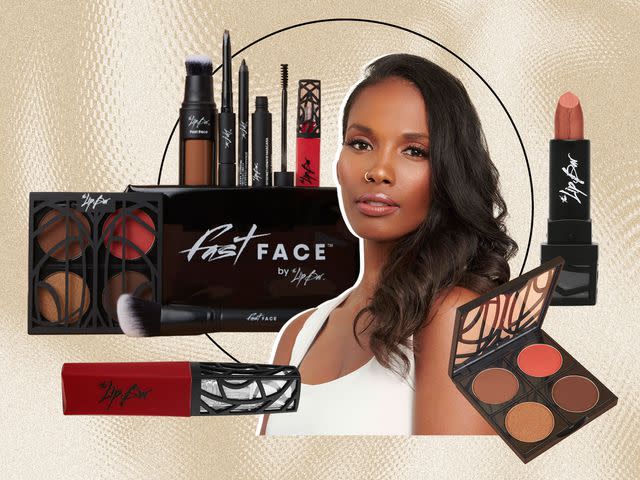
The Lip Bar
The Lip Bar is a household name amongst beauty lovers who enjoy bold lipsticks. Many knew of the brand after the founder Melissa Butler and creative director Rosco Spears appeared on ABC's Shark Tank in 2015, sporting their signature colorful lips. While they didn't leave with a deal, the brand has continued to flourish in the years since. Since launching in 2012, the brand has expanded its offerings beyond lipstick to include products like skin tints, mascara, and even skincare. She's also secured lucrative partnerships with retailers such as Target and Walmart. "Over the past two or three months, I've been able to pause and feel proud of myself," she previously told us while reflecting on her journey. "I started making lipstick in my kitchen. Now, my business is sold in multinational retailers, and I have a team of 25 women."
Wins for the brand:
The Lip Bar raised $6.7 million in funding in October 2022.
In 2020, the brand collaborated with Michelle Obama to create a limited-edition matte lipstick called Bawse Voter.
In 2023, the brand launched its first-ever skincare products.
Ami Colé

Ami Cole
Diarrha N'Diaye-Mbaye, a L'Oreal and Glossier alum, officially launched her makeup brand Ami Colé in May 2021. Having had a front-row seat to the industry, she saw a need for increased representation in the "clean" beauty market. "The formulations didn't have us in mind from the beginning," she shares. "I always felt like I was being squeezed into a space. There wasn't much thought about how we influence culture or spending."
Named after her mother, Ami Colé proudly states it creates "makeup for melanin-rich skin." Initially, the brand launched three products (the Skin-Enhancing Tint, Light Catching Highlighter, and Lip Treatment Oil) that have become cult favorites. As the brand has continued to grow, it has unveiled several new products (like the On Point Precision Brow Pencil) and launched with retailers, including Sephora and Thirteen Lune. It's clear N'Diaye-Mbaye's dedication to providing solutions for those who feel underrepresented has paid off.
Wins for the brand:
Ami Colé was on track to reach $2.5 million in sales by the end of last year.
The brand launched in Sephora stores in December 2022.
Last year, Ami Colé launched its Skin-Enhancing Concealer, Skin Melt Melt Loose Powder, On Point Precision Brow Pencil, and Ultra-Flex Brow Shaping Gel.
Danessa Myricks Beauty

Danessa Myricks Beauty
Danessa Myricks calls herself an "accidental makeup artist," but it's clear she was destined to work in beauty. Myricks has carved out an incredible career for herself as an MUA, working on countless campaigns and celebrity faces. However, she's found even greater fulfillment in creating products. "I really wanted to fill in the white space: Create for creators, create the unimaginable, think about products in a way that hadn’t been done before, and create products that move you to reimagine your beauty routine and how you play with makeup," says Myricks.
Her eponymous beauty line, launched in 2015, has become known for its eye-catching, thoughtfully-formulated products. The brand offers a full assortment of makeup must-haves, from foundation to cheek palettes. Danessa Myricks Beauty's steadily growing success has even led to a fruitful partnership with Sephora. "From the moment I started creating, the dream has always been to share my ideas and products with as many beauty lovers as I could find,” Myricks says.
Wins for the brand:
Danessa Myricks Beauty is still 100% self-funded.
Last year, the brand unveiled its mega-popular Yummy Skin collection, which features a foundation, serum, and viral balm powder.
In 2021, the brand made its debut in Sephora.
Carol’s Daughter
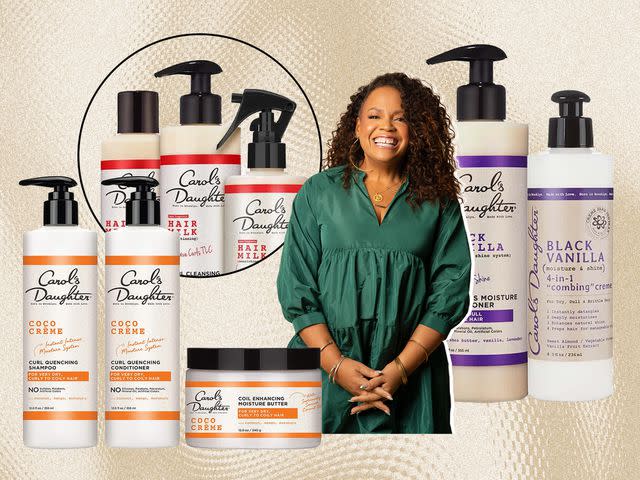
Carol's Daughter
Carol's Daughter has left an indelible mark on the natural hair industry. The brand's roots trace back to 1993 when Lisa Price began crafting hair and body products in her Brooklyn kitchen and selling them at local craft fairs. "In the very early days, I worked on formulas that I felt were lacking for me, and I began to discover that I liked having different textures and forms for different styles and even the weather—these were options that I was never able to find in stores," she tells Byrdie.
By 2000, Price had opened her first storefront and became one of the first natural haircare brands to sell its products online. Fast forward to 2014, Carol's Daughter hit $27 million in net sales, launched in Target, and entered an acquisition agreement with L'Oreal (though Price is still involved in the company). The brand's three decades of success have solidified its position in the market as a pioneer, paving the way for more Black hair care founders to flourish and scale their brands.
Wins for the brand:
In 2016, Carol's Daughter launched in 30K retail stores across the United States.
In 2022, the brand expanded its award-winning Wash Day Delight collection with four new styling products.
Carol's Daughter launched in the UK at retailer Superdrug at the end of 2022.
Shea Moisture
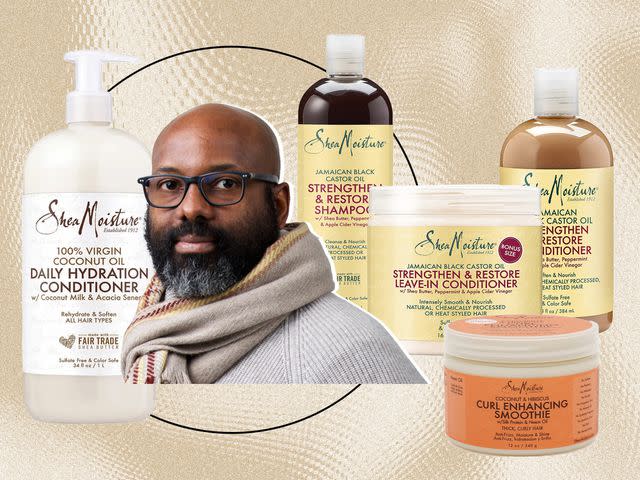
Shea Moisture
Shea Moisture is an instantly recognizable name. The brand's hair, skincare, and bodycare products can be found at nearly every drugstore today. However, the brand's success has been over 100 years in the making. Co-founder Richelieu Dennis drew inspiration for the business from his grandmother—a mother of four and entrepreneur, who sold shea butter and other homemade beauty products in Sierra Leone in 1912. Together with his mother, Mary Dennis, and Nyema Tubman, they launched Shea Moisture in 1991.
The brand steadily garnered a loyal audience in the following years and truly became a buzzy name amid the natural hair movement of the early 2010s. The popularity of Shea Moisture led to its acquisition by Unilever in 2017, becoming one of the largest beauty deals that year. The natural hair care company has continued to expand its offerings and has rolled out several community-driven initiatives to support its Black consumers. In 2020, Dennis created the New Voices Fund, a $100 million fund that invests in businesses owned by women of color. Since its launch, the fund has supported brands like The Lip Bar, Honey Pot, and Beauty Bakerie. "SheaMoisture is a business with a mission," Unilever's global head of purpose Simone Jordan says. "From its products to its investments, it puts the Black community first."
Wins for the brand:
SheaMoisture's parent company, Sundial Brands, became a Certified B Corporation in 2015, meaning they're committed to measuring their social and environmental performance.
In 2022, Shea Moisture re-invested $10 million back into communities of color.
The Coconut & Hibiscus Illuminating Body Scrub won a Byrdie Eco Award in 2021. The Coconut & Hibiscus Frizz-Free Curl Mousse won a Byrdie Award in 2022.
Topicals

Topicals
Once Topicals launched in 2020, it immediately resonated with audiences thanks to its ultra-cool and non-judgmental approach to treating chronic skincare conditions. Founded by Olamide Olowe, who has dealt with issues like hyperpigmentation and acne, the brand has consistently released products that thoughtfully fill gaps in the market. Case in point: the best-selling Faded Serum (reviews have garnered over 2.9 million views on TikTok). But not only does Topicals have a pulse on product innovation—the brand also has a seamless ability to mesh beauty with culture. With each launch, the skincare company has tapped major names in music, like Baby Tate, to front its campaigns.
Given the brand's track record over the last two years, it's clear that there are no signs of things slowing down at Topicals HQ. The brand continues to be backed by high-profile investors like Bozoma Saint John, Hannah Bronfman, and Yvonne Orjie. Through the investments she's received, Olowe has become the youngest Black woman to raise more than $10 million in venture funding. So, what's next? “You can expect us to keep making products for underserved chronic skin conditions," she shared. "For so long, people with visible skin conditions have been made to feel less than, and we’re here to change that. People with visible skin conditions are dynamic and fluid folks who live their lives in color."
Wins for the brand:
In 2021, the brand expanded its product line to include body mists. In 2022, the brand debuted an ingrown hair serum and under-eye masks.
In 2022, Topicals secured $10M in funding from Cavu Partners.
Topicals is currently available at 500 Sephora stores in the United States.
Fenty Beauty

Fenty Beauty
With Fenty Beauty, Rihanna was determined to shake things up from the start. The brand, which debuted in 2017, launched with the Pro Filt’r Soft Matte Longwear Liquid Foundation in an impressive 40 shades. The extensive shade offerings immediately sparked the "Fenty Effect," a phenomenon describing the way companies followed Rihanna's lead and extended their foundation ranges to include 40+ shades.
Fenty Beauty has remained ahead of the curve and a focal point of beauty industry conversations over the last six years. They've released other widely-praised products like the Gloss Bomb Lip Luminizer, Match Stix Contour Stick, Stunna Lip Paint, and Eaze Drop Blurring Skin Tint. The Fenty Beauty empire has also expanded to include skincare and fragrance (hair care products are reported to be on the horizon). Not to mention, the brand currently sits on the shelves of both Sephora and Ulta Beauty.
Wins for the brand:
Fenty Beauty successfully executed the first-ever global beauty launch in history. In 2017, the brand rolled out simultaneously online and in 1,620 stores in more than 17 countries.
Fenty Beauty doubled its revenue in 2022.
Ahead of Rihanna’s 2023 Super Bowl LVII performance, Fenty Beauty dropped a limited-edition Game Day Collection.
Uoma Beauty

Uoma Beauty
Uoma Beauty dominated the beauty conversation in 2019, launching an impressive 51 shades of foundation. With Sharon Chuter (a former executive at companies like Revlon and Benefit Cosmetics) leading the brand, it's no surprise the brand has continued to make an impact in the industry. For Chuter, who is of Nigerian heritage, amplifying diversity has always been central to her work. This is clearly evident in the brand's shade ranges, visuals, and subsequent launches.
However, Chuter's commitment to increasing inclusivity doesn't just extend to her makeup brand. The beauty founder is an outspoken advocate for championing DEI across the entire beauty industry. Amid the racial reckoning of 2020, she launched the Pull Up For Change campaign, which called on brands to disclose the number of Black people working at their company and create action plans to improve. In February 2021, she launched the Pull Up For Change Impact Fund to provide capital to Black founders, who are often severely underfunded. Simultaneously, she rolled out the Make It Black initative. Uoma Beauty partners with other brands through this program to transform their best-selling items with all-black packaging. Proceeds from each product's sales go toward Chuter's impact fund.
"I'm a big believer in 'talk is cheap,'" she says. "We all complain about the things we're not happy with, but no one is prepared to risk it all to be part of the solution; that's why I embarked on this journey. I've put it all on the line and hope that at the end of the day, I play a small part in making the world a better place; a place where women who look like me understand that they are truly beautiful and have the courage to explore that from the outside in."
Wins for the brand:
In 2021, through the Make it Black initiative, Chuter raised almost $400K to establish the Pull Up For Change Impact Fund. $370K was given to eight founders in the form of grants ranging at the Essence Festival of Culture in June 2021.
Uoma Beauty has launched several standout products since 2019, like the Drama Bomb Mascara.
Uoma Beauty launched a limited-edition makeup collection inspired by the film Coming 2 America in 2021.
Pattern Beauty
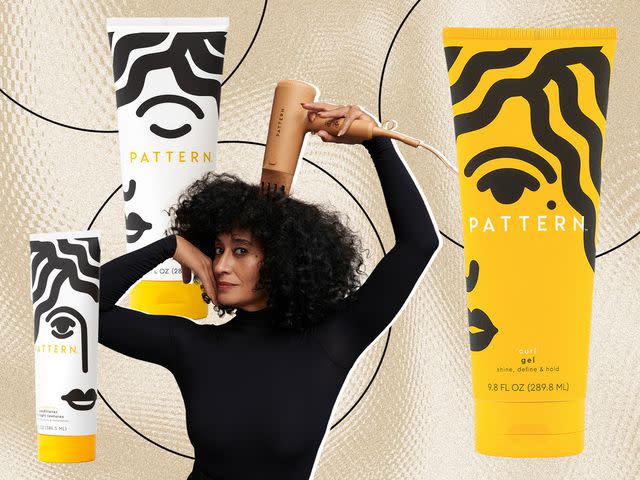
Pattern
Beauty icon Tracee Ellis Ross spent over 10 years ruminating on the idea of launching a hair care brand before unveiling Pattern Beauty in 2019. "I've been dreaming of launching a haircare line for so long because there is a community of extraordinary people—a big, bold, stunning community—that has unmet beauty needs that have not been addressed, not been serviced, not been understood, not been cared for, not been celebrated," she says.
Upon its launch, the brand was an instant hit among people with curls and coils. It initially debuted in Ulta Beauty with a curated edit of conditioners, leave-in products, and shampoo—each housed in sleek yellow and black packaging. Over the last three years, the Pattern Beauty assortment has grown to include much more (like masks, styling tools, and heat-focused products). The brand also expanded into Sephora stores in 2021. Regardless of the brand wins, Ross takes the most pride in being able to celebrate Black hair in an authentic and empowering way. "The story of Pattern is the story I've been telling through all the women I have portrayed, and the humanity I've been really conscious and clear about sharing with the world through my work and my platform: Embrace your pattern, embrace your true self. Love it, nourish it, and it will serve you. You can defy gravity," she notes.
Wins for the brand:
Pattern Beauty launched in Canada in 2021 and the UK in 2022.
The brand launched its first hot tool, a curl-friendly blow dryer, in 2023.
Pattern Beauty entered a partnership with Macy's this year, establishing its first relationship with a department store.
Black Opal and Fashion Fair
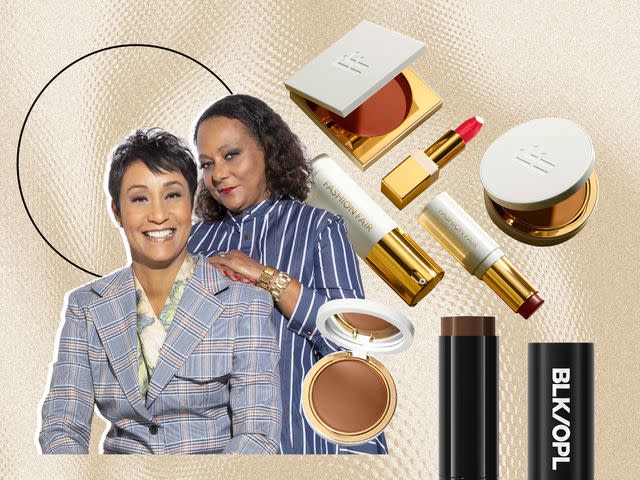
Black Opal / Fashion Fair
Desiree Rogers and Cheryl Mayberry-McKissack are passionate about preserving Black history. It's why they decided to acquire Fashion Fair and Black Opal in 2019. Fashion Fair was initially led by legendary businesswoman Eunice Johnson in 1973, an executive at Johnson Publishing Company and founder of the mega-popular traveling fashion show Ebony Fashion Fair. The brand caught on because it created department-store quality makeup for Black women at a time when options were meager. Similarly, Black Opal (created by chemist Niko Mouyiaris) struck a chord with Black consumers in the mid-'90s, delivering color cosmetics (like its hero stick foundation) that didn't appear ashy on the skin.
Rogers and Mayberry-McKissack see a unique opportunity to preserve the legacy and spirit of the iconic brands while still modernizing them for Gen Z and millennial audiences. "I believe it is a good thing to preserve these iconic brands that have always served our community, and to lift them up, and to grow them," says Mayberry-McKissack. "Because the base they established can't be duplicated."
Since they've taken ownership of the brand, Fashion Fair and Black Opal have both relaunched with a brand new look and feel. The former is exclusively available at select Sephora stores, and the latter is sold at Ulta Beauty. Both brands have also secured support from influential women in Hollywood. Upon launching, Actress Kiki Layne signed on as Fashion Fair's brand ambassador, and multi-hyphenate entertainer Ryan Destiny became Black Opal's first celebrity face.
Rogers says we can expect both brands to continue making exciting moves like this. "We want to be game-changers on the cosmetics side, surprising and delighting our consumers, but we also want to be game-changers in the business of cosmetics, ensuring that we can create wealth for as many different minority- and woman-owned companies as we can," she notes.
Wins for the brand:
In 2019, Black Opal was reportedly earning approximately $10 million in annual retail sales.
Renowned makeup artist Sam Fine signed on to be Fashion Fair's global makeup ambassador in 2019.
The 2022 HBO documentary The Beauty of Blackness documented the process of relaunching Fashion Fair Cosmetics.
Black Girl Sunscreen

Black Girl Sunscreen
There were a few reasons behind Shontay Lundy's decision to launch Black Girl Sunscreen in 2016. First, she wanted to address the lack of SPF products for people of color, as many brand formulas leave a white cast on melanin-rich skin. Secondly, Lundy wanted to dismantle the longstanding myth that Black people don't need SPF. Over the last seven years, Black Girl Sunscreen has continued to create inclusive and innovative sunscreen products, like its signature SPF 30. The brand has also established partnerships with Target and Ulta Beauty along the way. However, for Lundy and the Black Girl Sunscreen team, the most fulfilling aspect of this journey is fostering greater dialogue surrounding sun safety and skin health among people of color.
Wins for the brand:
As of 2019, Black Girl Sunscreen became available in over 200 Target stores nationwide.
In 2020, Black Girl Sunscreen secured a $1 million investment, valuing the brand at $5 million.
In 2022, the brand launched its first lip care product, Make It Pop Sun Gloss SPF 50.

